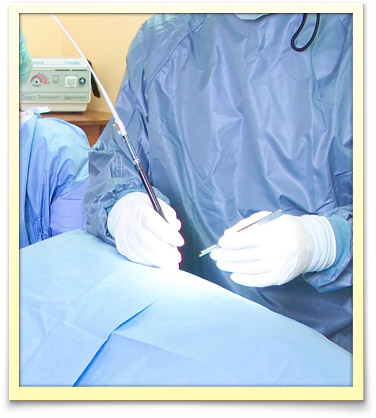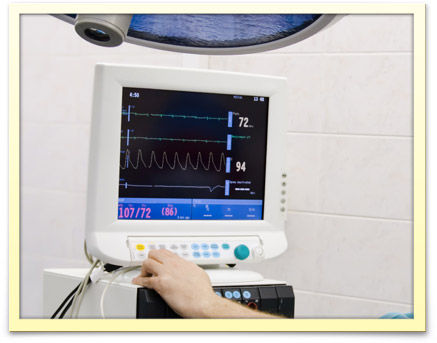Your Pet's Surgery at Native Palm Animal Hospital
 Laser Surgery for Jupiter Pets
Laser Surgery for Jupiter Pets
Our Jupiter veterinarians at Native Palm Animal Hospital use lasers to perform many pet surgeries. In laser surgery, a highly focused laser beam efficiently vaporizes the affected living tissue. It simultaneously seals capillaries, small blood vessels, lymphatics, and nerve endings. Laser surgery has significant benefits to both pets and surgeons.
The procedures we perform include (but are not limited to):
- Spays and neuters
- Growth excisions
- Abdominal exploratory procedures (splenectomy, foreign body removals, gastronomy)
- Cystomies
- Hernia repairs
- Wound repairs
At Native Palm Animal Hospital, we fully understand the decision to allow your pet to undergo any surgery is never an easy one. To that end, we are happy to answer any questions regarding your pet's specific surgery. Additionally, our medical staff is happy to provide you with information on postoperative care and support to ensure a rapid return to your pet's happy, healthy self.
Benefits for Your Pet
Less Bleeding: As it makes an incision, the laser seals small blood vessels. The result is a significant reduction in bleeding which enables different surgical procedures to be utilized for optimal results for your pet.
Less Pain: The CO2 laser beam seals nerve endings and lymphatics, which results in less edema and pain for your pet. Less pain also means less recovery time for your pet's post-operative healing.
Reduced Risk of Infection: One of the most unique features of the CO2 laser beam is that it efficiently kills bacteria in its path, producing a sterilizing effect. Quicker Recovery and Healing Time: Reduced risk of infection, less bleeding and pain and less swelling allow you pet to make a quick recovery after surgery.
Benefits for Surgeons
Increased Surgical Capabilities: Laser surgery improves many surgical procedures by simplifying them and reducing risks generally associated with surgery.
Enhanced Visibility of the Surgical Area: The laser light seals capillaries and small blood vessels as it cuts and thereby dramatically reduces bleeding. This provides a much clearer and drier surgical site for the surgeon.
Increased Precision:A laser beam's focal spot may be adjusted down to a small fraction of a millimeter or expanded for wider coverage. The laser power may also be set for rapid removal of large tissue amounts or adjusted to remove only one cell layer at a time.
Reduction of Surgery Time: The hemostatic effect of the laser beam and the improved visibility of the surgical area reduces the surgery's overall duration.
Pre-Surgery Examination
Before your pet undergoes any surgical procedure, a thorough examination takes place. This exam includes a pre-surgical blood screen, which, along with your pet's anesthetic history, breed, preexisting conditions, and age, will determine a unique anesthesia protocol. These tests have the added benefit of establishing a baseline for the comparison of future blood tests, should your pet require any.
 Advanced Anesthesia
Advanced Anesthesia
For most surgical procedures, anesthesia is required. At Native Palm Animal Hospital, we use Isoflurane anesthesia. While under anesthesia, your pet is continuously monitored by both our staff and specialized anesthesia monitoring technology. Your pet's blood pressure, heart rate, respiratory rate, body temperature, and oxygen level are all tracked using state-of-the-art Cardell monitoring equipment during surgery. We also use a temperature-controlled operating table to assist in maintaining a constant body temperature during the procedure.
Customized Pain Management
Just as with humans, pain has many negative effects on pets that go beyond physical discomfort. Pain after surgery can slow healing and worsen diseases like arthritis. And, because our companion friends don't understand why they are experiencing pain, pain can cause behavioral issues and interfere with the bond between you and your pet.
To minimize your pet's discomfort, we typically use a combination of local anesthetics, NSAIDs, and narcotic pain relievers. The exact protocol is tailored to each animal, and depends on a number of factors that are determined by the pre-surgery exam and during the procedure.
Postoperative Care and Healing
The amount of time your pet will need to monitored after surgery varies. In some cases, animals will need to be monitored overnight; in others, they can be sent home the same day. When your pet is discharged, Dr. McMindes or Dr. Burgess will provide you with information on proper home care after surgery.
If your pet is prescribed medication, we will explain how and when to administer it. We will also be available to answer questions after your pet arrives home. Please contact one of our veterinarians at (561) 747-9991 with any questions or concerns following surgery and we will be more than happy to help you.
If you have any questions about Native Palm Animal Hospital's surgical services for pets in Palm Beach County, please send us an email or call our Jupiter veterinary team at (561) 747-9991.
